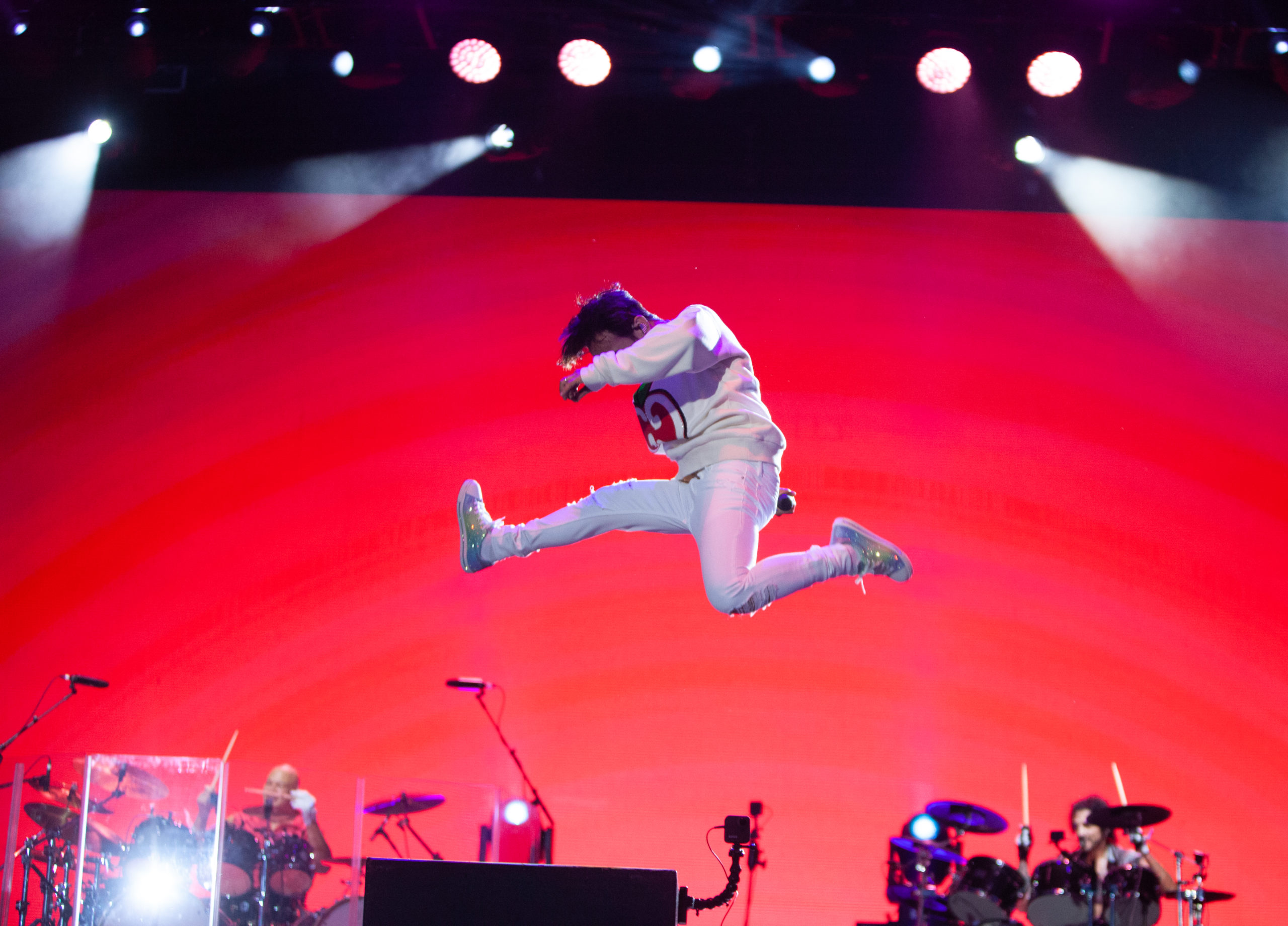When Neal Schon revealed in April that Journey was playing Lollapalooza, the collective world met it with an eyebrow raise, a shoulder shrug and everything in between (especially when you factor in that little pandemic thing that may or may not be shutting down the country again). It seemed like an odd match for one of the ’80s’ biggest jukebox heroes (and the Adult Contemporary radio pioneers) to be playing the granddaddy of what was the alternative scene.
Yet, there we were on a sticky Chicago July afternoon, the ones out of town-ers hear about but never like to acknowledge ’til they’re in it, and the latest edition of the classic rockers’ lineup was set to close out the Bud Light Seltzer stage. Talk about strange bedfellows: Journey was competing against Post Malone on the other side of Grant Park.

So, why Journey? Were the festival bookers crazy? Or were they crazy like a fox?
Admittedly, I thought the Journeyaissance was over, 14 years after interest in the band was rekindled by The Sopranos in 2007. Looking back at that moment, keyboardist Jonathan Cain remains coy about it being the start of something new, but acknowledges it as being one of the defining moments in the band’s nearly 50-year career (and that’s not to mention Ed Helms’ character in The Hangover Part II wearing a Journey tour shirt at his bachelor brunch).
“My kids were watching it this morning!” Cain remarked backstage as Limp Bizkit’s “Break Stuff” blared through the trailer’s walls. “[The Sopranos creator] David Chase called us a year before and said ‘Your song is going to end The Sopranos, and do you have a problem with it?’ I said I’m good with it but [ex-singer Steve] Perry had to see the script, and the rest is history.”
Though not Gen Z, millennials and seasoned vets Young the Giant said they too were excited to see the Rock and Roll Hall of Famers after their own set on the main stage on the other side of the park. They agree with that the cultural impact of The Sopranos accelerated the interest in the band’s catalog.
“I would guess that Sopranos fans around here, right?” guitarist Eric Cannata said. “That was like the quintessential Journey placement.”
“But the young kids now, I think all the young kids probably have danced at every single wedding they’ve ever been to to that song,” drummer François Comtois said of “Don’t Stop Believin’.” “And seeing how happy it makes like the adults in the room, maybe there’s a Pavlovian response to it. I think they don’t want to stop believing.”
But that’s not enough evidence. That series ended over 14 years ago.
Roaming around the grounds, we discovered that not only was the usual crowd of boomers (albeit in smaller numbers) excited, but younger musicians were fired about the pop-rock legends’ inclusion. Some weren’t aware of the lineup change and that this was their first major show, but instead, referred to the power of the band’s catalog, although the way they found their way in was a literal case-by-case basis.

“The reason why young people like Journey, in my opinion, is because they were on Guitar Hero and also Family Guy,” Tyler Posey told us. “I think they did karaoke [on Family Guy] of ‘Don’t Stop Believin” and that resonated.”
Jude Ciulla of Laundry Day attributes the familiarity to a similar reason as Posey: smart TV licensing.
“Gen Z loves Journey because back in the day there was a little show called Glee that all of us Gen Z-ers loved,” he explained. “And there was a special episode, I believe it was called ‘Journey to the Regionals’ where they did a lot of Journey songs, and that’s the only reason I know anything of Journey. I mean, ‘Don’t Stop Believin” it’s just a special track. So I just need to experience that song.”
Motherfolk had their own theory. One member attributed it to TikTok, another said that trends come back around, and yet another cited the band’s killer drum grooves. All make sense in their own way.

Southern California-based indie rockers the Aquadolls were stoked about seeing the stadium rock giants playing, even though they weren’t alive when the band was at the peak of their powers.
“The reason why I think Gen Z really likes Journey is because of trend cycles,” Keilah Nina said. “People love the nostalgia and love romanticizing things they weren’t a part of and didn’t actually experience.”
Her bandmate, Jackie Proctor, said that there could be a better reason for how they discovered Journey.
“Maybe their dads or uncles listen to it, and then you grow up on it and you’re like ‘Oh my God, yeah, Journey!'” she said. “Then at one point you don’t like them, and then you get older and you’re like ‘Wait, this is fucking rad.'”

So how did Journey manage to endure nearly four decades after hitting their peak and manage to find fans who weren’t alive when they last dominated the airwaves with new material? Cain attributes it to a simple formula.
“Because we’re singing about their lives,” he said. “They’re still singing about hope and love. Promise and dreams can come true. You’re not stuck where you are. You’re somebody that’s got dignity. That’s what it is. Not much has changed. We all want to be happy. We all want to be to see our vision come true for us. We all have dreams and we’re continuing with that.”
But more importantly, does Cain have inside info over whether or not Tony Soprano died?
“We will never know,” he said with a sly grin. “That’s the beauty. That’s David Chase. It’s one of TV’s greatest unsolved mysteries.”
But Journey’s influence on Gen Z isn’t.





